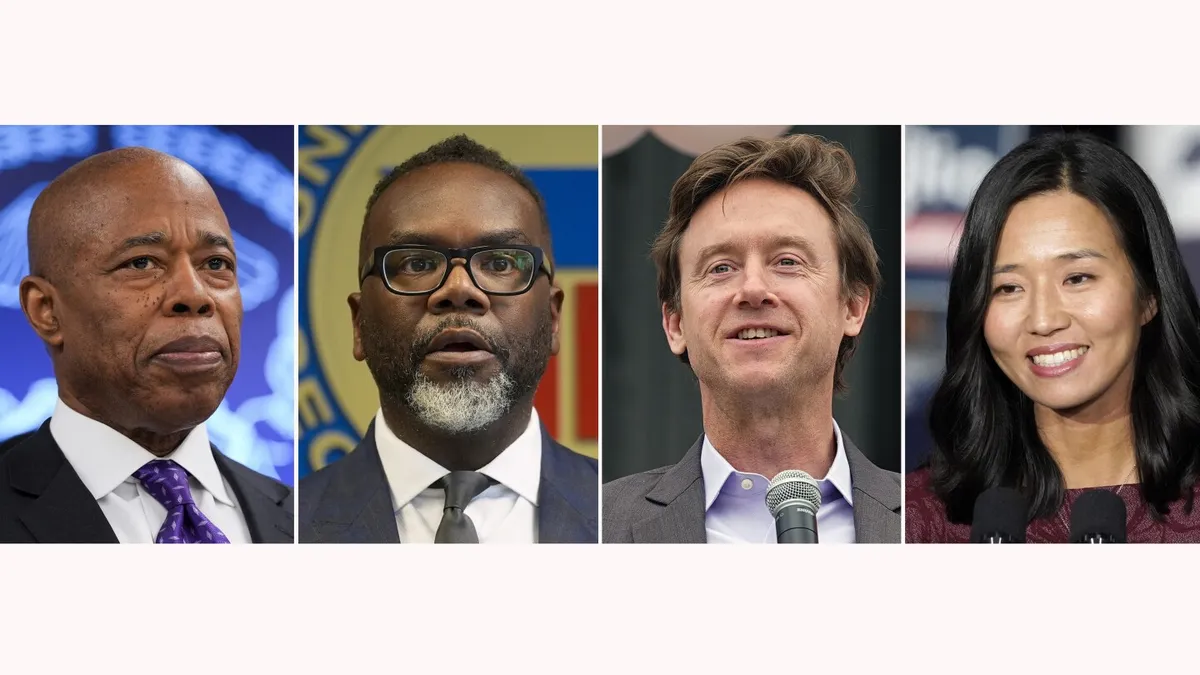
In a significant move, Republicans in Congress are focusing their efforts on four prominent sanctuary cities—Boston, Chicago, Denver, and New York City. This inquiry aligns with President Donald Trump's ongoing campaign for mass deportations and is set to take place during a hearing this week. The mayors of these cities, including Michelle Wu of Boston, Brandon Johnson of Chicago, Mike Johnston of Denver, and Eric Adams of New York, are scheduled to testify before the House Committee on Oversight and Government Reform.
While there is no universally accepted definition for sanctuary policies or sanctuary cities, these terms generally refer to locations that limit their cooperation with Immigration and Customs Enforcement (ICE). ICE plays a crucial role in enforcing U.S. immigration laws, often relying on state and local authorities for assistance in large-scale deportations. Typically, ICE requests that local law enforcement notify them about individuals they intend to deport and hold these individuals until federal agents can take custody. However, many cities contend that such cooperation discourages crime victims and witnesses from coming forward, particularly those who may be undocumented immigrants. As a result, these cities strive to create welcoming environments for immigrants.
Judicial rulings have consistently upheld the legality of most sanctuary laws. Nevertheless, the Trump administration has aggressively targeted these policies, viewing them as obstacles to the mass deportation agenda. Legal actions have been initiated against cities like Chicago and states such as Illinois and New York for their immigration laws.
In Boston, the Trust Act restricts police cooperation with ICE, although it does allow some collaboration with the Homeland Security Investigations division for addressing issues like human trafficking. Additionally, a ruling from Massachusetts' highest court in 2017 prohibits state authorities from detaining individuals solely based on federal requests. Such requests, known as detainers, typically ask law enforcement to provide advance notice before releasing suspected undocumented immigrants. If local jurisdictions do not comply, ICE is required to conduct community arrests.
Tom Homan, the Trump administration’s border czar, has publicly criticized Boston's police commissioner, vowing to take action in the city. In response, Mayor Michelle Wu, who is seeking reelection, condemned Homan's comments as “clueless” and “insulting,” reiterating her commitment to making Boston a welcoming place for immigrants. Suffolk County District Attorney Kevin Hayden emphasized that surrendering defendants to ICE undermines cooperation from immigrant communities in crime investigations.
Chicago has established itself as one of the nation's most protective cities regarding immigration policies, prohibiting cooperation between city employees, including police, and federal immigration agents. The city adopted sanctuary status in the 1980s and has enhanced its policies multiple times, particularly after Trump's election in 2016. A 2012 ordinance specifically bars federal agents from utilizing city resources for immigration enforcement.
Under Mayor Brandon Johnson, who took office in 2023, Chicago has faced a migrant crisis, housing thousands of asylum-seekers in various temporary locations, including police station lobbies and hotels. Although attempts to weaken Chicago's sanctuary protections have been made, they have been unsuccessful. Johnson has affirmed his commitment to welcoming individuals and families seeking a better life in the city.
Denver has become a key destination for immigrants, with approximately 43,000 arrivals over the past two years. Mayor Mike Johnston has struggled to allocate resources for housing and feeding these newcomers, facing significant budget constraints. The situation escalated when a video depicting armed individuals in a Denver suburb went viral, prompting Trump to claim that the city was overrun by gangs, a claim that local officials quickly dismissed.
Despite the challenges, Johnston has reiterated his desire for Denver to be a welcoming city while drawing a firm line against violent crime. Recently, Denver Public Schools became the first district to sue the Trump administration over its policy allowing ICE agents access to school facilities.
New York City has seen an influx of approximately 231,000 immigrants since 2022, resulting in a financial burden exceeding $7 billion for essential services such as shelters and legal aid. Last month, the city filed a lawsuit against the Trump administration over the recovery of $80.6 million meant for immigrant aid. Mayor Eric Adams has expressed support for policies ensuring all residents, regardless of immigration status, can access social services. However, he is also advocating for changes that would enable city employees to assist with immigration enforcement, including honoring ICE detainer requests.
Adams’ critics argue that his push for collaboration with federal authorities is an attempt to navigate federal corruption charges. As New York continues to grapple with the complexities of immigration, the city's leaders remain committed to balancing support for immigrants while ensuring public safety.
As the hearing approaches, the impact of these sanctuary policies and the ongoing immigration debate will undoubtedly remain at the forefront of national discussions.